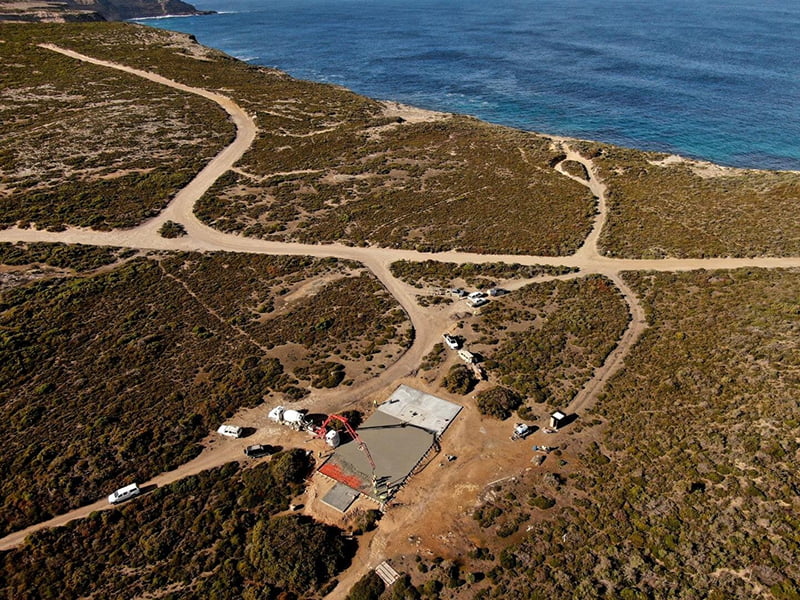Six Australian space firms have shared in just under $5.5 million as part of the latest round of the federal government’s Moon to Mars Supply Chain Capability Improvement grants.
Around $5.46 million in grants were awarded through the fifth intake of the Supply Chain Improvement program, with just under $11.7 million of the $25.7 million available through this scheme having been distributed so far.
Companies are able to apply for the $250,000 to $1 million grants, to cover up to 75 per cent of projects costs. Applications can be submitted anytime until 1 May 2023, with the next intake closing on 16 June.

Adelaide-based Southern Launch has received $986,568 for development of a mobile launch rail for sub-orbital vehicles weighing between 20kg and 3,500kg. The launcher will allow further testing to be undertaken at the company’s Koonibba Test Range and Whalers Way Orbital Launch Complex, both in South Australia.
Canberra-based and UNSW Canberra Space spinoff Skykraft has landed $978,000 to facilitate pointing accuracy upgrades to its proprietary Attitude Determination and Control System. Pointing refers to the direction a spacecraft faces, also known as its attitude.
Currently the firm’s earth observation platform is being developed for air traffic management services to be delivered through a constellation of low earth orbit spacecraft. The upgrade will make it capable of supporting earth observation payloads for a mission to the moon. In 2023, it will undergo flight qualification for Technical Readiness Level 9, the last stage before full commercial deployment.
Brisbane-based Valiant Space has received $750,000 to continue developing an in-space non-toxic propulsion system. This will include two demonstration flights of Valiant’s VS-1 thruster hardware. The firm in June 2021 received $200,000 through the Moon to Mars Initiative Demonstrator Feasibility Grant program to integrate its thruster with a Skykraft satellite bus.
Melbourne-based NextAero has scored the maximum $1 million to improve its current testing capability for portable liquid rocket engines. NextAero will produce a High Thrust test Stand capable of withstanding force greater than 30 kilonewtons. The firm is currently capable of testing small scale prototype thrust engines that produce one to three kilonewtons of force.
The remaining $1 million and $750,000 grants went to Conflux Technology and EvokeEdge respectively. Conflux specialises in Rocket Heat Exchanger Production while EvokeEdge specialises in edge computing.
The $150 million Moon to Mars initiative is administered through the Australian Space Agency. It is intended to allow Australian firms to participate in the United States-led public-private Moon to Mars exploration program which includes NASA’s Artemis program, which expects to return humans to the moon in 2024.
The Moon to Mars program was announced in March 2021 as a part of the Morrison government’s $800 million Australian Civil Space Strategy 2019-2028. The space sector was also one of the six national manufacturing priorities under the Coalition’s flagship industrial support program, the Modern Manufacturing Initiative.
Deputy Prime Minister and former Shadow Minister for Science Richard Marles has previously welcomed the Moon to Mars grants. At the end of 2021, Mr Marles also called for the further government support for the space sector.
Prime Minister Anthony Albanese has yet to make any commitments to the space sector but has pledged to create a $15 billion National Reconstruction. The funds will be distributed by an independent board, similar to the Clean Energy Finance Corporation, through loans, equity, and guarantees This includes a $1 billion critical technologies fund and a $1 billion advanced manufacturing fund.
The federal government is aiming to produce another budget in October this year.
Do you know more? Contact James Riley via Email.


wish to be included in Australian Space program as I have done done experimental research in Japan for one year based at Institute of Space and Astronautical Science (ISAS), Kanagawa on micro-heat pipes applicable to cooling of the leading edges of the air-shuttles at the re-entry in the earths atmosphere in micro-gravity. Regards- Jai